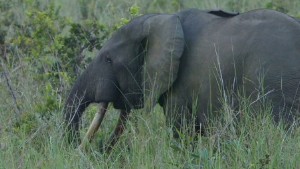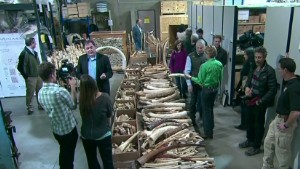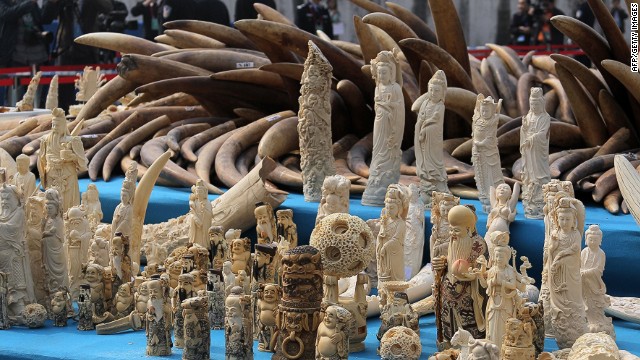China crushes tons of illegal ivory
January 6, 2014
STORY HIGHLIGHTS
- China crushed 6.15 tons from its stockpile of confiscated elephant ivory
- China accounts for 70% of the world's ivory market
- The event comes two months after the U.S. destroyed its own stockpile
- Animal welfare groups welcomed the move as a first step to combat wildlife trafficking
(CNN) -- China is cracking down on the illegal ivory trade.
Several tons of confiscated elephant tusks and carvings were crushed in a ceremony in the city of Guangzhou on Monday -- just two months after the United States destroyed its own ivory stockpile.
Conservationists have welcomed the move as a monumental shift in the government's approach to the ivory trade, and a crucial first step for China -- the world's largest ivory market -- to tackle illicit wildlife trafficking.
Some 6.15 tons of ivory were destroyed on Monday -- equivalent to one-sixth of the illegal ivory confiscated worldwide in 2012 -- according to May Mei, the Chinese chief representative of wildlife protection group, WildAid, who attended the ceremony.


It's the first time China, which accounts for around 70% of global demand for ivory, has destroyed any of its stockpile.
The fact that China is taking a public stance against the practice is an encouraging sign, says Jeff He, special assistant to the Asia Regional Director at the International Fund for Animal Welfare (IFAW).
"With the government taking such a symbolic action, it sends out a very strong message to the potential consumers that the government won't allow any illegal trade in ivory," he said.
Ivory is known as "white gold" in China and tusks with intricate carvings can fetch almost $3,000 per kilogram on the black market. One of the biggest challenges remains dampening demand among consumers, say animal welfare campaigners.
According to a 2013 WildAid report, many Chinese residents have little awareness of how ivory sales contribute to the poaching that has caused the world's elephant population to dwindle in recent years.
"This event in itself is not going to solve these issues," said Joe Waltson, Asia Program Director at the Wildlife Conservation Society, "but that doesn't mean it doesn't have any value."
"It needs to be welcomed, if only to embolden those within the Chinese government who are pushing for more substantive action on this issue," Waltson said.
"It could really have an impact on the conservation of African and Asian elephants."
A report released by the Convention on International Trade on Endangered Species last year found that the global illegal ivory trade has tripled in the last decade, in spite of 1989-ban on the international trade of the product.
According to the IFAW's Jeff He, a rise in demand from Asia, and especially China, in recent years has fueled the black market and put increasing pressure on African elephants in the wild.
The elephant population in Africa has now shrunk to around half a million, from 1.2 million in 1980. Nearly one hundred African elephants are killed for their tusks every day, according to the Wildlife Conservation Society.
To help wipe out the demand for ivory, conservation groups have called on governments to destroy confiscated ivory stockpiles, which often require substantial resources to keep secure.
On November 15, the U.S. destroyed its entire 6-ton stockpile of ivory "to send a clear message that the United States will not tolerate ivory trafficking and the toll it is taking on elephant populations, particularly in Africa." Similar events have taken place in the Philippines, Gabon, and Kenya in the last three years.


ไม่มีความคิดเห็น:
แสดงความคิดเห็น